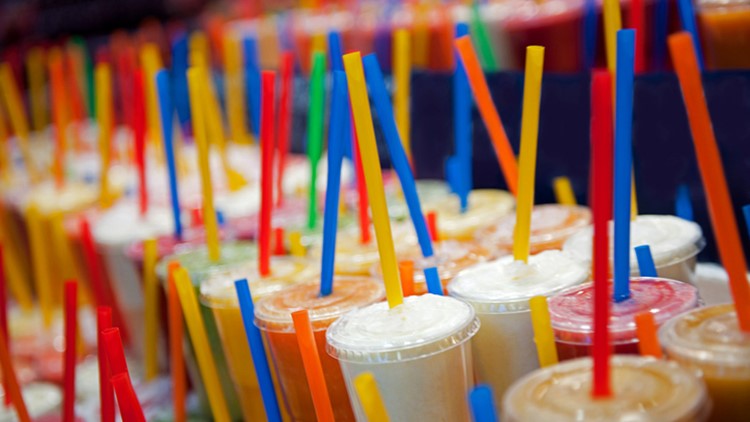A big food-service company with eateries at major U.S. college campuses, museums and other institutions is going to ban plastic straws and stirrers at all of its more than 1,000 locations in 33 states.
Bon Appétit Management said Thursday it will start phasing in the ban immediately and that it will be complete by September 2019. Then, it will offer paper straws to diners who have physical challenges or “strongly feel the need” for one.
Plastic straws have become an issue because they can foul beaches or waterways and, in most cases, aren't really necessary for drinking. Americans use an estimated 500 million disposable plastic straws every day, according to Eco-Cycle, a Boulder, Colo.-based non-profit recycler.
McDonald's is testing paper straws in the United Kingdom and putting plastic ones behind the counter, available only upon request. Last week, shareholders of the Oak Brook, Ill.-based burger chain voted against a proposal that called on the company to study the business risks of using plastic straws.
Bon Appétit, based in Palo Alto, Calif., bought 16.8 million plastic straws and close to 420,000 plastic stirrers in its fiscal year ended Aug. 31. Bon Appétit, now that its shift from plastic is getting underway, bought 9.1 million wooden stirrers.
"We thought, 'We've got to do something about this.' As many as we buy, we shouldn't be doing this anymore," Bon Appétit CEO Fedele Bauccio said. "We need an alternative."
He added that the new straws are made of compostable cardboard-like material that doesn't become mushy, the common complaint about paper straws. The company, currently deciding between two suppliers, knows either version will be more expensive than plastic ones but won't pass the cost along to customers.
"We want to do the right thing for the environment," Bauccio said. "Hopefully, this will spark other people in the industry to follow. ... We are a large company and can set an example."
Before its full ban takes place, Bon Appétit locations that run out of plastic straws are allowed to re-order them, the company's chief strategy and brand officer Maisie Ganzler explained.
The inspiration for Bon Appétit's ban came, in part, from the University of Portland in Oregon, where students worked to outlaw plastic straws on campus in April. Bon Appétit has a contract with the university, which is Bauccio's alma mater.
The company's other clients range from the Art Institute of Chicago and the Getty Museum in Los Angeles to the on-campus cafeterias at Vassar College and Washington University in St. Louis.
New York City is considering nixing plastic straws, as several cities, such as Miami Beach, Seattle and Malibu already have. Alaska Airlines is phasing out plastic stirrers on its flights.
On Monday, the European Union proposed new rules to reduce litter in the oceans, including a ban on single-use plastic items, including cutlery, plates, straws and drink stirrers.
Dianna Cohen, CEO of Plastic Pollution Coalition in Berkeley, Calif., commends Bon Appétit for the action it's taking and pointed out that outlawing items people can easily live without is a first step.
"It's a great beginning," she said. "Plastic bags and plastic straws are the tip of the iceberg. Plastic straws really are a gateway into understanding this single-use kind of ethos that we’ve created and are living in."



